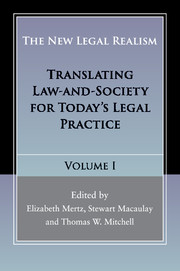Book contents
- Frontmatter
- Contents
- List of contributors
- Preface to The New Legal Realism, Volumes I and II
- 1 Introduction: New Legal Realism: Law and Social Science in the New Millennium
- Section I THE PLACE OF NEW LEGAL REALISM IN LEGAL THOUGHT AND TEACHING
- 2 A New Legal Realism: Elegant Models and the Messy Law in Action
- 3 Putting the “Real World” into Traditional Classroom Teaching
- 4 Some Realism about Realism in Teaching about the Legal Profession
- 5 “Fielding” Legal Realism: Law Students as Participant-Observers?
- Section II PHILOSOPHY AND METHODS FOR A NEW LEGAL REALISM
- Section III NEW LEGAL REALIST TRANSLATIONS
- Index
- References
5 - “Fielding” Legal Realism: Law Students as Participant-Observers?
from Section I - THE PLACE OF NEW LEGAL REALISM IN LEGAL THOUGHT AND TEACHING
Published online by Cambridge University Press: 05 May 2016
- Frontmatter
- Contents
- List of contributors
- Preface to The New Legal Realism, Volumes I and II
- 1 Introduction: New Legal Realism: Law and Social Science in the New Millennium
- Section I THE PLACE OF NEW LEGAL REALISM IN LEGAL THOUGHT AND TEACHING
- 2 A New Legal Realism: Elegant Models and the Messy Law in Action
- 3 Putting the “Real World” into Traditional Classroom Teaching
- 4 Some Realism about Realism in Teaching about the Legal Profession
- 5 “Fielding” Legal Realism: Law Students as Participant-Observers?
- Section II PHILOSOPHY AND METHODS FOR A NEW LEGAL REALISM
- Section III NEW LEGAL REALIST TRANSLATIONS
- Index
- References
Summary
INTRODUCTION
As talk of “crisis” justifies suspension of established legal orders, we are only beginning to understand the far-reaching impact of these suspensions under law's increasingly global purview. But while many scholars in the social sciences have embraced Agamben's critical perspective on the “state of exception” (2005), lawyers and legal educators have been slower to do so. We still proceed largely as though our profession is charged with accretion and application of sound principles and not also with increasingly frequent derogation of those under declarations of “crisis.”
For at least this reason, legal realism has never been a more important tool for students of professional law. And as I will suggest in this brief essay, a highly effective way to develop this tool is through careful, well-directed legal ethnography – also known as participant-observation. Legal ethnography offers an empirical method by which students can leave “law in books” to observe and document “law in action” in the complicated social environments in which they reside. In this piece, I justify the value of this method, first by demonstrating how adopting social science in law teaching helps students address general legal problems in more sophisticated ways, and second by conveying my own experience using ethnographic assignments as a law professor in first-year doctrinal and upper-division courses. There, over several years of crafting, administering, and assessing such assignments, I have developed what I believe to be a streamlined approach to the employment of social science theory and method complementary to law pedagogy.
Ethnography is subject to several variations in interpretation and practice. For some, it is simply a research methodology defined by long-term, embedded qualitative data collection. It places the researcher “on the ground” within a community whose boundary formations are often themselves one of the objects of study. Its output consists of meticulous field notes and informant interviews capturing the symbols, practices, and narratives by which people make sense of their universe. For others, ethnography is far more than this; it is an outlook placing the researcher's own cultural assumptions in productive tension with those of her environment, and one attuned especially to the ongoing fabrication of “reality” through meaning-making. Under both views, ethnography attends more than any other approach to the cultural thread of which social fabric – law included – is woven.
- Type
- Chapter
- Information
- The New Legal RealismTranslating Law-and-Society for Today's Legal Practice, pp. 95 - 118Publisher: Cambridge University PressPrint publication year: 2016



